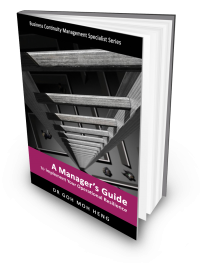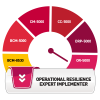Operational Disruptions: Difference between revisions
No edit summary |
No edit summary |
||
| Line 27: | Line 27: | ||
{{BcmBoK 2 CL 1C}}<br/><br/> | {{BcmBoK 2 CL 1C}}<br/><br/> | ||
{{BcmBoK 2 CL 1CC}}<br/><br/> | {{BcmBoK 2 CL 1CC}}<br/><br/> | ||
{{BcmBoK 2 CL 1D}}<br/> <br/> | {{BcmBoK 2 CL 1D}}<br/><br/> | ||
{{ORBoK 1: P1 Plan CL 1OR}}<br/> | {{ORBoK 1: P1 Plan CL 1OR}}<br/><br/> | ||
{{ORBoK 1: P1 Plan CL 1ORA}}<br/> | {{ORBoK 1: P1 Plan CL 1ORA}}<br/><br/> | ||
{{Bcm Institute Source}} | {{Bcm Institute Source}} | ||
|} | |} | ||
Latest revision as of 16:17, 4 September 2024
| 1. Operational Disruptions are any disruptive events that can impact an organisation's risk, manifesting in a host of operational issues.
 Operational Disruption: Notes (1): when identified, it emphasizes to the organisation to mitigate the harmful impact on its production or delivery of business services potential rather than its risk. Notes (2): is a high-impact disruption of normal business operations affecting a large metropolitan or geographic area and the adjacent communities that are economically integrated with it. Notes (3): typically affect the physical infrastructure Notes (4): impedes the normal operation of the financial industry and commercial organisations from providing its critical business services. Notes (5): can result from a wide range of events, such as earthquakes, hurricanes and other weather-related events Natural Threat, terrorist attacks and other intentional or accidental acts that cause widespread damage to the physical infrastructure Man-made Threat. Notes (6): can include the following sample of List of Threats and Types of Crisis 
| |||||||||||||||||||||||||||||||||||||||||||

